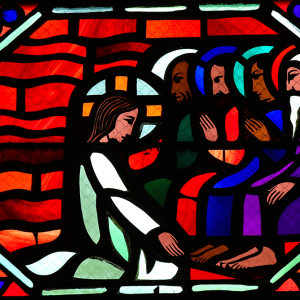
Reta Halteman Finger, a retired associate professor of New Testament and freelance writer, lives in Rockingham, Va.
Posts By This Author
Can Paul Be Redeemed?
Why some of us love Jesus and don't like Paul
“Jesus was a radical who welcomed everyone and criticized powerful leaders who oppressed the poor. Jesus was crucified because he was a political threat. But the Apostle Paul was a conservative missionary who misunderstood Jesus and was anti-woman, pro-slavery, and anti-gay.”
That seems to sum up how many progressive Christians view Paul. But are such views justified by the biblical record? Or are there other ways to understand the zealous Pharisee who became an apostle to the Gentiles?
IN THE EARLY 1970s, I came across an article on Jesus’ women disciples in the Christian social justice magazine The Other Side. I was shocked. I had attended church all my life; how come I never noticed those women disciples?
What I didn’t know then was that a renewed “search for the historical Jesus” was underway. Applying the ever-developing insights of sociology, anthropology, and archaeology, scholars were investigating the socio-economic and political aspects of life in first century Palestine. How did Jesus fit into his historical context? As a peasant healer, how did he challenge the Roman occupation and their clients, the chief priests at the temple in Jerusalem?
It takes a while for new insights from biblical research to reach lay Christians. This is further delayed if church leaders are suspicious of intellectual elitism and fearful some of their parishioners might “lose their faith.”
A River Runs Through It
A Bible study about water in the New Testament
"HOW DID THIS HAPPEN?" pondered the middle-aged woman as she panted up the road to her village of Sychar, water jar forgotten. “How did we get into this heavy theological conversation from a simple request for a drink of water? Sometimes conversations take sharp turns, but this is just too bizarre. I’ve known a number of men in my life, but only the crazy ones told me they were the messiah! Better check this out with the town elders.”
In contrast to the approximately 800 references to water in the Hebrew Bible, the New Testament is relatively spare. A friend explained the difference. The ancient Hebrews emerged from the eastern desert cultures of Egypt and Babylonia (now Iraq), which built their empires around rivers and where water was scarce and precious. But the New Testament writers were oriented toward the wetter West, where seafaring Greeks and Romans had appropriated the Mediterranean Sea as their major mode of transportation and conquest. For example, even though the book of Acts only mentions the word “water” in reference to baptism, the early missionary movement depended on travel by ship to spread the gospel message.
Water in the synoptic gospels
All four gospels introduce us to John the Baptist down by the Jordan River, who dunks in its flowing water those who repent from sin as a symbol of their cleansing. After John moves offstage, the synoptic gospels center much of Jesus’ activity in the towns around the Sea of Galilee. Here he not only teaches from a boat (Matthew 13:2; Luke 5:3), but he and his disciples travel in it from one side of the lake to the other, which includes a miraculous walk on and rebuking of the stormy waves (Matthew 14:22-27; Mark 6:47-52; Luke 8:22-25). Other references to water are few and sometimes incidental.
Jesus and the Top Secret Empire
In Matthew's gospel, the "littlest ones" are key to the upside-down kingdom.
WATCHING THE PBS Frontline documentary “Top Secret America” in April reminded me of why I read the gospels. They help me get my head screwed on right—upside-down, that is.
In that show, Pulitzer-Prize-winning reporter Dana Priest investigates the secret history of anti-terrorism in America since 9/11. “Secret” is the key word, since the public has little idea of the injustice, torture, black sites, civilian-killing drone strikes, data-mining, over-surveillance, and general terrorizing that have been done in our name and with our tax money for the past 12 years. The Boston Marathon bombings will only up the ante.
“Empire,” I think as I watch. Our American empire has secret tentacles in every part of our inhabited world. Cofer Black, then head of the CIA’s Counterterrorism Center, announced after we were attacked on 9/11, “The gloves come off!” In other words, we will do whatever it takes to obliterate al Qaeda. “We went in [to Afghanistan] to kick ass. And we did!”
Restraining gloves have apparently stayed off, since little has changed in the Obama administration. No current national security big shot would speak to Frontline. It’s “top secret,” of course, since in public we are supposed to be a democracy and not an empire.
I THINK OF texts from the gospel of Matthew—radical texts penned under the thumb of the Roman Empire. A couple of years ago, I was asked to write “insight essays” for a teacher’s guide in the “Gather ’Round” series of Sunday school lessons for children and youth published by the Brethren Press and MennoMedia. The first seven lessons leading up to Easter were centered on texts from Matthew 18-28. I struggled to find a common thread running through these stories and sayings leading up to the final events in Jesus’ life.
Mother Jesus
The roles that Jesus plays in John's gospel echo those of women in first-century Palestine.
“HAVE YOU BEEN born again?” The image of a second birth to illustrate conversion is often used by fundamentalist and conservative evangelical Christians. Yet in my experience such folks also tend to resist thinking of God as other than male. How can they overlook this very maternal activity of God’s Spirit?
Even Nicodemus gets it, at least at the physical level. In John 3, this high-ranking Jewish leader privately approaches Jesus to ask him where his charism comes from. In most familiar translations of the New Testament (such as King James and NIV), Jesus tells Nicodemus that he would understand if he were “born again” (3:3). But the Greek word anōthen is deliberately ambiguous. Jesus’ intended meaning is “born from above” (NRSV). “That which is born of the Spirit is spirit,” says Jesus in verse 6. The Holy One is our birthing mother.
When the literal-minded Nicodemus asks how a person can go back into his mother’s womb and be born again, we cannot be sure (in 3:9-10) whether Jesus gently chides or sarcastically puts him down: “Are you a teacher of Israel, and yet you do not understand these things?”
Sadly, many “teachers” throughout Christian history have not understood these things. It is now 50 years since Betty Friedan’s The Feminine Mystique opened the floodgates of second-wave feminist cultural analysis, thus preparing the ground for biblical scholars and theologians such as Letty Russell, Rosemary Radford Ruether, Elizabeth Schüssler Fiorenza, and many more. Some of us began to see that orthodox, “objective” methods of interpretation were instead often subjectively male-oriented. We began to ask, “Where is the feminine in our sacred texts? Were women there?”
I see five ways in which the gospel of John deconstructs, or at least unsettles, the rigid patterns of patriarchy in the family and society in which Jesus lived. The roles Jesus played during his life and ministry were so atypical that they color this entire narrative.
To Comfort the Afflicted
If we read 1 Peter's message to immigrants, exiles, and foreigners only as a metaphor, we risk missing the point.
ONCE UPON A TIME, long before there were birth certificates or Social Security numbers, there were immigrants. If you are or have been an immigrant without documents, you may think life must have been easier then, that you would never be afraid of getting found out and deported.
But life was not easier—at least not in the first century C.E., in the five mostly rural Roman provinces in what is now Turkey. Especially if you were a follower of Jesus.
As an immigrant, you are called by one of two names in Greek, the trade language of the time. You are a paroikos if you had fled or been forced from your native community for any personal, economic, or political reason and were trying to eke out a living in a foreign land. Oikos refers to "house" or the economic structure of the extended household in which native people lived. Para means "alongside of." In other words, you are "away from home," a resident alien on the edges of ordinary life.
Consequently, you have fewer rights than full citizens. Never able to own land, you are a sharecropper, a craftsperson, or perhaps a small trader or shopkeeper. You may have been driven off your land by high taxes you could not pay, or perhaps you are a second son and will not inherit your father's land. You may be the wife or daughter of such a man, or a widow driven to support yourself and your children. You have legal restrictions regarding intermarriage, commerce, and succession of property. You have no political rights, such as voting in public assemblies or joining in guilds. Unlike citizens, if you are charged with a crime, you can be tortured.
Paul's Letter to the 1%
The apostle's attack on elitism in Corinthian church and society speaks a clear message about inequality today.
Each Sunday, in many churches across North America, congregants hear these words preparing them for communion: “The Lord Jesus, on the night when he was betrayed, took a loaf of bread ...”
However, few churchgoers kneeling for bread and wine at the altar may know that these words in 1 Corinthians 11:23-26 are set in a longer section (11:17-34) that begins sharply: “Now in the following instructions, I do not commend you, because when you come together, it is not for the better, but for the worse!” Paul continues the attack in verse 20: “When you come together it is not really to eat the Lord’s supper. For when the time comes to eat, each of you goes ahead with your own supper, and one goes hungry, and another becomes drunk” (emphasis added).
What Paul describes sounds more like a food fight in a high school cafeteria than our solemn rituals. Have we missed something in this text?
This article isn’t mainly about food. It’s about inequality—the 99 percent versus the 1 percent. But when you live in the Roman Empire where most inhabitants live at or below subsistence, earning enough daily bread is the main thing you think about.
A longtime friend, George McClain, and I are presently finishing a curriculum simulating a house church planted by Paul in Corinth during the years 50 to 51 C.E. We owe much to the research of biblical and classical scholars and archeologists on power relations in the Roman Empire. This “empire-critical” method examines the sociological, political, religious, and economic structures that underpin first century Rome. Such structures contrast starkly with the “kingdom of God” as proclaimed by Jesus and his apostle Paul.
Reading Romans Anew
I have always felt some tension about using the church's common lectionary.

